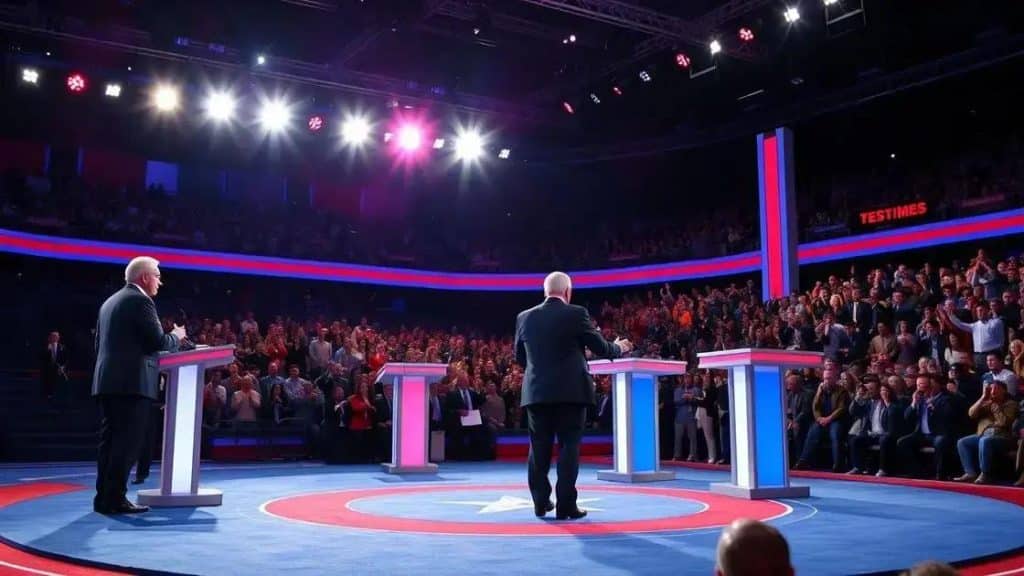Friend presidential debate coverage: what to expect

Presidential debate coverage plays a crucial role in voter decision-making by providing insights into candidate performances, fostering viewer engagement, and helping the public evaluate key issues directly.
Friend presidential debate coverage offers an exciting glimpse into candidates’ strategies and perspectives. Have you ever wondered which moments could sway voters?
Key highlights from the presidential debates
Presidential debates are significant events that shape public opinion. They offer a platform for candidates to address critical issues and connect with voters. In this segment, we’ll explore some key highlights from the presidential debates that can impact your choices.
Memorable Moments
Each debate often includes standout moments that resonate with viewers. These instances can define a candidate’s campaign and sway voters. For instance, when a candidate effectively counters their opponent’s claims or addresses a pressing issue, it captures attention.
- Candidates’ responses to unexpected questions.
- Emotional appeals that connect with the audience.
- Creative strategies to highlight policy differences.
As we continue, it’s important to consider how these highlights reflect a candidate’s personality and leadership style. For example, a passionate defense of a controversial policy can showcase their commitment, while a hesitant response might raise doubts.
Impact on Voter Perception
The impact of these moments extends beyond the debate stage. They play a crucial role in shaping public perception. Viewers often recall specific quotes or gestures that influence their decisions when voting.
Additionally, social media amplifies these moments. Clips go viral, sparking conversations and further influencing voters. Engaging online can create a community around certain candidates, making these highlights even more significant.
- The way candidates handle criticism enhances their image.
- Effective storytelling can resonate deeply with voters.
- Body language during debates sends strong messages.
Ultimately, the key highlights from presidential debates serve as a mirror to the candidates’ strategies and values. Voters need to pay attention to these details as they prepare to make informed decisions during elections.
How to analyze candidate performances

Analyzing candidate performances during presidential debates is crucial for voters. Understanding how candidates communicate can help you form informed opinions. By focusing on various aspects, you can gain insights into their abilities and suitability for the role.
Evaluating Communication Skills
Effective communication is vital for a candidate’s success. Observing their clarity and confidence can reveal a lot about their readiness for office. Look for how they articulate their ideas and connect with the audience. Strong candidates often engage listeners with compelling arguments.
- Pay attention to how they structure their responses.
- Notice their use of language to simplify complex issues.
- Evaluate their tone and body language for authenticity.
The way candidates respond to questions also provides insights. Some may deflect tough questions while others embrace them. This often reflects their stance on issues and willingness to face challenges directly.
Assessing Substance Over Style
While style matters, the substance of what candidates say is equally crucial. Focusing on their policies and proposals can help you identify who aligns best with your values. Pay close attention to specifics about their plans and how they differentiate themselves from opponents.
- Look for concrete examples in their responses.
- Analyze their knowledge about key issues.
- Assess how they handle follow-up questions for depth.
It’s also important to consider how candidates react under pressure. Their ability to stay composed in challenging situations can be indicative of their leadership capabilities. A candidate’s response to criticism or difficult questions might reveal their character and resilience.
Importance of debates in voter decision-making
The importance of debates in voter decision-making cannot be overstated. These events provide a unique opportunity for candidates to present their views and for voters to assess their potential leaders. Voters often look for clarity, confidence, and character during these exchanges. Watching debates helps voters become more informed about the issues at stake.
Understanding Candidate Positions
Debates serve as a stage where candidates clarify their positions on key issues. Voters can see how candidates differ on topics like healthcare, education, and the economy. Many times, a debate is the first time voters hear comprehensive explanations from each candidate.
- Candidates showcase their policies and priorities.
- Voters can compare candidates directly on the same stage.
- Live reactions can reveal a candidate’s spontaneity and authenticity.
When debating, candidates have the chance to connect with voters on a personal level. These interactions often shape opinions and can lead to shifts in voter support based on their performance in these high-stakes environments.
Impact on Public Perception
Moreover, debates influence public perception. They generate discussions among friends and family, expanding on what candidates represent. After watching a debate, many voters engage in conversations that help clarify their thoughts.
- Debates can enhance or diminish a candidate’s reputation.
- Memorable quotes or moments can go viral, impacting views.
- Voter sentiment can shift as they process the debate outcomes.
In the digital age, social media plays a significant role in amplifying debates. Clip sharing and commentary create a broader reach, making debate performances a focal point of public discourse. The buzz surrounding these events often continues well beyond the debate night itself.
Viewer engagement during live coverage

Viewer engagement during live coverage of presidential debates plays a vital role in shaping public opinion. When people tune in, they become part of a larger conversation about the future of their country. Engaged viewers often analyze candidates’ performances and discuss them with friends and family. This engagement enhances the overall impact of the debates.
The Power of Real-Time Interaction
Live coverage allows for real-time interaction between viewers and the debate. Audiences can express their thoughts on social media platforms as events unfold. This immediate feedback creates a dynamic atmosphere where opinions can shift rapidly.
- Viewers share their reactions and critiques online.
- Polls and live comments gauge public sentiment during debates.
- Candidates may alter their strategies based on viewer reactions.
Such interactions attract more viewers to future debates. Engaged audiences are likely to watch upcoming events, wanting to participate in ongoing discussions. The excitement generated by social media can draw in undecided voters who feel compelled to join the conversation.
Enhancing the Viewing Experience
To keep viewers engaged, networks often incorporate various elements into their live coverage. They provide instant fact-checking, expert analysis, and interactive polls. These features enhance the overall viewing experience, making it more informative and entertaining.
- Fact-checking helps clarify candidate statements.
- Expert analysis offers deeper insights into debate performances.
- Interactive polls engage viewers directly in the discussion.
Viewers who actively participate in live coverage often feel a stronger connection to the issues being debated. Their engagement can influence their final decisions, making it essential for candidates to perform well in front of a live audience. Ultimately, viewer engagement transforms debates into shared experiences that resonate long after the cameras stop rolling.
FAQ – Questions about Presidential Debate Coverage and Voter Engagement
Why are presidential debates important for voters?
Presidential debates help voters understand candidates’ positions and make informed choices on key issues.
How does viewer engagement impact debates?
Viewer engagement during live coverage enhances discussions, allowing for real-time reactions and deeper analysis of candidates.
What should I look for in candidate performances during debates?
Focus on candidates’ clarity, confidence, communication style, and how they handle tough questions.
How can social media influence voter perceptions during debates?
Social media amplifies memorable moments from debates, shaping public opinion and encouraging discussions among potential voters.





